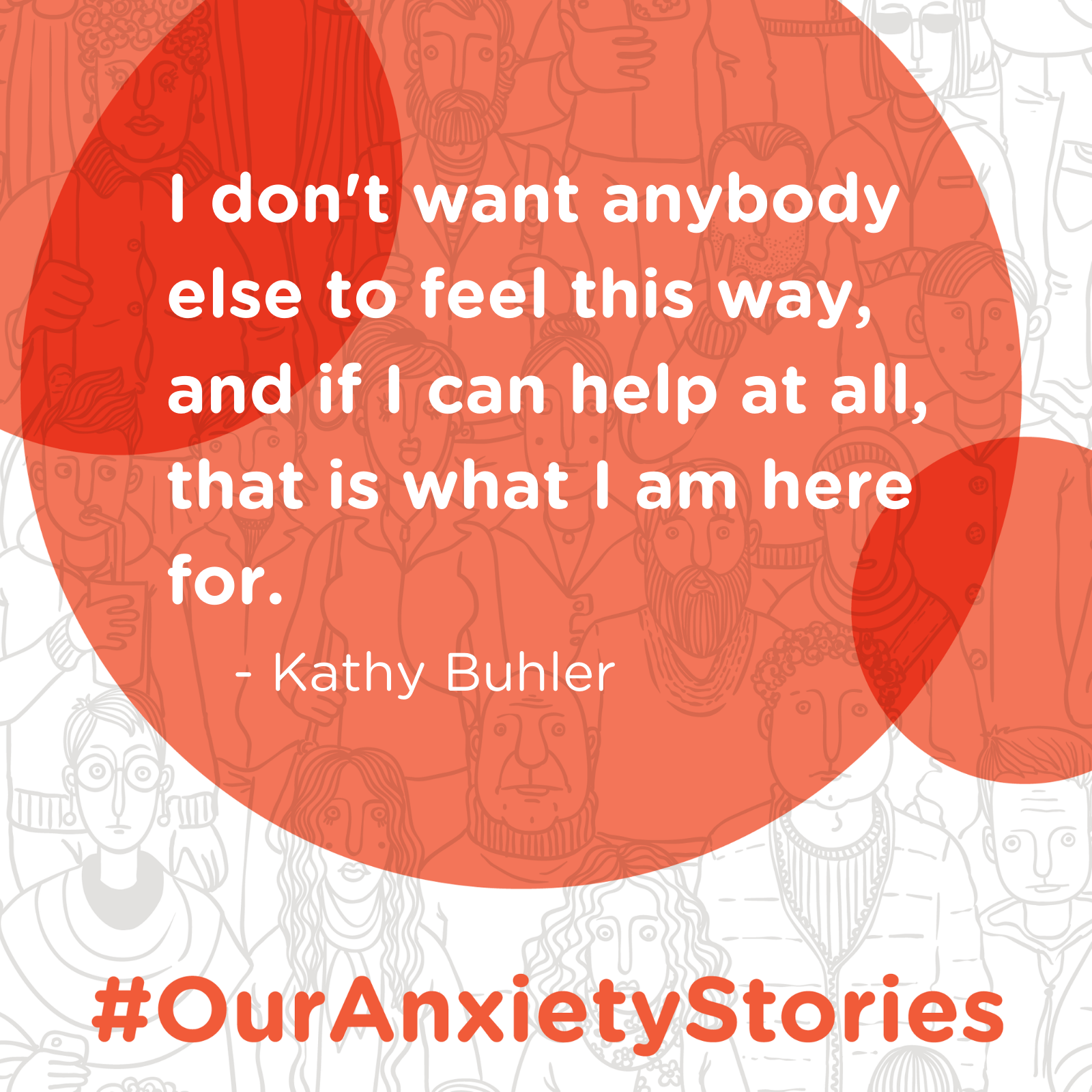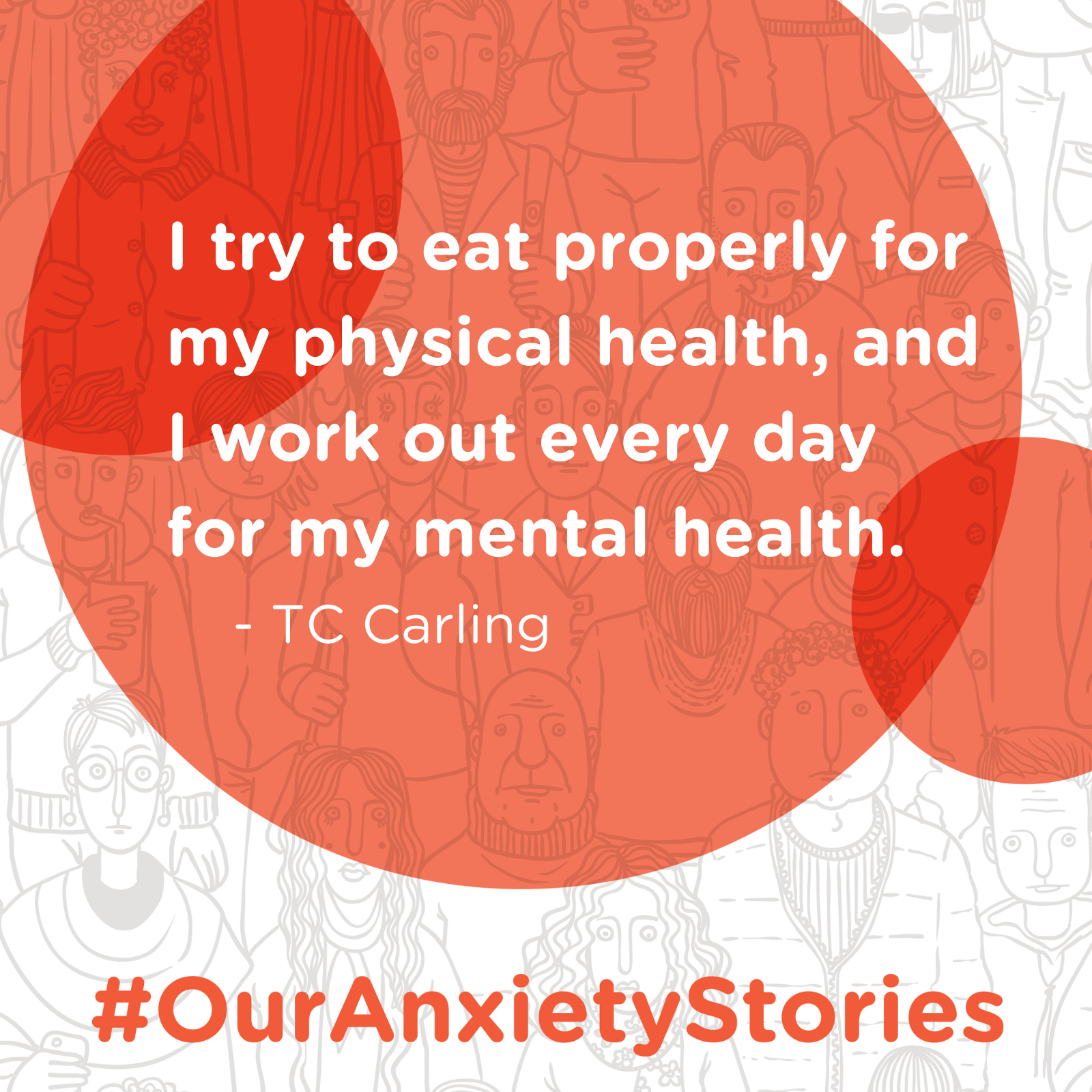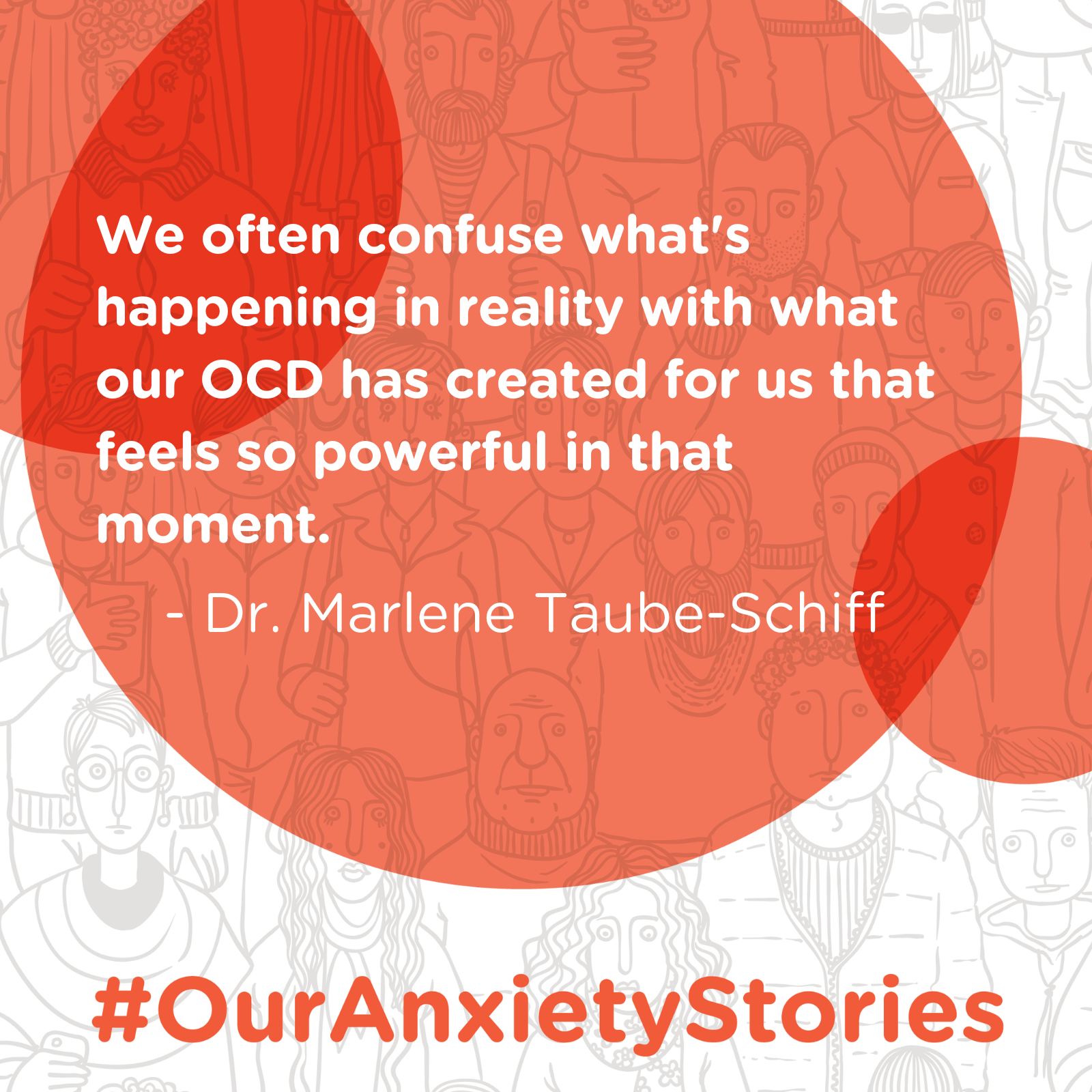Episode Transcript
Speaker 1 00:08 You are listening to our anxiety stories, the anxiety Canada podcast with Jon Bateman, check out anxiety canada.com for more totally free anxiety resources including our app mind CBT. <inaudible>
Speaker 0 00:22 welcome to our anxiety stories. I really appreciate you being part of this.
Speaker 2 00:26 Of course. Yeah. Thank you so much for having me. It's a really cool thing that you guys are doing today.
Speaker 3 00:29 Yeah. Yeah. Thanks. Um, if you could, uh, if you could start by this, the simple yet seemingly complicated question of uh, what's your anxiety story?
Speaker 2 00:41 Okay, yeah, for sure. Okay. So, um, my anxieties story started, I would say probably about 10 years ago. Um, the first time that I had experienced difficulties with anxiety was when I was doing my undergraduate degree in university and I had my first panic attack in the middle of an exam and I really had absolutely no idea what was going on. Um, I'd never heard anybody talk about anything like that before. Um, and it was so far outside of what I would have considered like the, you know, a normal experience up until that point. I remember like sitting down and writing an exam, um, and about like an hour into it, just like my heart pounding out of my chest and feeling like the room was closing it around me just being like, what the heck is going on? I thought like something like, seriously medically wrong, what's going on.
Speaker 2 01:36 I remember getting up, going to get a drink of water, you know, tried to kind of walk it off and then, you know, that's not really how paddock works, which I didn't know at the time. So of course it didn't quite go away. Um, and then eventually by the end of the exam it did come down and they went home and kinda looked up and figured like, okay, this is what had happened. It's called in a panic attack. Um, and then you didn't have any issues for quite some time after that until I started grad school. And then, and you know, this was years and years later at about three months into grad school, it was Christmas time and it was really busy with, um, papers being due. And it was also like, you know, I had a fellowship but I was working and it was just kind of an overwhelming time. Um, and I started having the panic attacks again. And this time I knew what was happening because it has happened two years ago, but I didn't realize that it could happen more than like a one off.
Speaker 3 02:34 Yeah. But it also would be great if it was. Yeah, yeah. Yeah.
Speaker 2 02:39 So, um, again I was really surprised that I kind of kept having like more and more of them. And this time we lasted about a month and it was a really scary, terrible time, but then it kind of went away.
Speaker 3 02:50 <inaudible>
Speaker 2 02:51 um, and then I took a couple more years and I didn't have any really experiences with, with paddock or with, you know, difficulties with anxiety. Um, and then I like to say the big one hit because this wasn't like a one off or a one month. Um, I started having like really consistent panic attacks.
Speaker 3 03:10 So, so multiple over,
Speaker 2 03:14 yeah, multiple and you know, multiple in a day, kind of consistent and constant. Um, and it went for months and months. Uh, and my panic was becoming, you know, really, really severe. I wasn't able to go to work or go to school anymore. Um, I was having trouble, you know, leaving my house and something happened to me called depersonalization.
Speaker 3 03:39 Right? Yes. I've, I've experienced that.
Speaker 2 03:42 Yeah. Really, really scary. So for me, my depersonalization was actually also quite severe. It wasn't like just in the moment of the panic, it was something that had kind of, you know, become also consistent in my life. So, um, not only was I living with panic disorder, but also with depression,
Speaker 3 04:00 that would be a ferry. I mean, having experienced that sort of on just, just a little bit, that would be very, uh, yeah, that'd be a very difficult thing to deal with consistently.
Speaker 2 04:11 Yeah. It was terrifying. It was absolutely a terrifying time in my life because there wasn't necessarily like I would say any, you know, one of the things about panic disorder is that there aren't necessarily always going to be triggers, but for me it ended up that like me and myself became what I would say the trigger.
Speaker 3 04:30 Could you, could you take a second if you're comfortable, um, you explain what a panic attack felt like to, and I think it's important to share are symptoms of panic attacks because they're all slightly different but somewhat the same. What, what was here, what would you say the symptoms were if a depersonalization?
Speaker 2 04:44 Right. Okay. So for me it felt like there's a couple of different ways that I can describe what the personalization feels like. Like one of the ways that I describe it is I think people, lot of people can relate to this. If you fall asleep during the day and have sort of like an inappropriately long nap and you wake up and you're kind of in this paddock because like you missed the school bus and like, nevermind, you're 35 what ways did your head even go there? Right. You just kind of wake up, disoriented and you don't really know what's going on even though you're just on your couch. So that's one of the ways I can kind of describe it another way is like you just feel like you're not quite there or in your body. Yeah. Even though you know that you are,
Speaker 3 05:25 aren't, people describe it as an out of body type experience.
Speaker 2 05:28 It's a very much, yeah. But you, but you're very conscious of it, which is, yeah, it's, it's terrifying. It's the other thing I used to describe it as like, it's similar to that feeling of hearing your voice on an answering machine.
Speaker 3 05:43 Yeah.
Speaker 2 05:44 Well I guess answering machines aren't so much,
Speaker 3 05:46 but I know what you're saying. You're in your brace over when you listen to this podcast later. Yes. Hear in their voice. Yeah. Yeah. Um, I, yeah, mine was similar in the, in the sense that it was like a, that I would feel that, but then I'd feel like my hands were detached from my, from my boss, like, and I felt like I was wearing a mask. Um, I felt like I was more an observer in this kind of shell. It was really weird experience.
Speaker 2 06:12 Yeah. For sure.
Speaker 3 06:12 Yeah. And then another thing to emphasize, what seems to be coming into focus a lot during it as the day goes on, it's control is it's like you feel like you're not in control or this, it's this different kind of thing that's controlling, which is really disconcerting.
Speaker 2 06:30 Yeah. Yeah, for sure. And I think that's one of the things that really, um, made me feel like there was nothing that I would ever be able to do to get better. Like it was definitely something happening to me. Yeah. And not something that I could be doing anything about, which I know now isn't necessarily true.
Speaker 3 06:48 Yeah. Well, it's, what's important is it's not permanent. Um, and that they kind of come and go on their own comfortable, just the same as panic attacks. And it's kind of always my first line of defense. If I feel something like that that might be actually close. I, I do tell myself that this is, this is, you know, gonna come and it's gonna go. Um, there's a lot of power in that. I want to ask you a question about, uh, it says you're a, a M a and a public education coordinator at the anxiety disorders association of Manitoba. Tell me a little bit about what, what you do there.
Speaker 2 07:18 Okay. Right. So, um, I am in charge of public education at the anxiety disorders association of Manitoba. Um, and for anybody who doesn't know about our organization, I'm guessing that's probably quite a lot of people or a peer support. Oh, sorry. Yeah. So yeah, we're a peer support organization. So, um, it's my job to make sure that people in our communities around Manitoba and specifically, you know, Winnepeg that's where our offices know that, um, you know, anxiety <inaudible> anxiety is that it's common, that it's treatable. How to maybe recognize if they're having issues with that, what they can do about that. Um, I see a lot of light fog as contributing to like both information dissemination and de-stigmatization because a good chunk of what I do is also tell my story and make sure that people know that anxiety looks like any kind of average person. It happens to anybody. And, um, yeah. So, you know, I go and I give presentations and we have information sessions and we have displays and you know, all kinds of cool stuff to make sure that Manitobans know, um, that there are resources out there to help them. And that anxiety, you know, it's a thing you're not alone and we can do something about it.
Speaker 3 08:40 Yeah. That's, that's obviously an incredible service. So it's kinda, it's like a, you know, within your walls or within what you do, you, you create a community of people who are likeminded and it serves them in that way. It helps them deal with their condition that way.
Speaker 2 08:54 Absolutely. And like, we just know how powerful that is when people are a part of the community, when people know, um, that they don't need to isolate right then that's, we can empower ourselves that there are people who understand you. Yeah. It's so powerful for people with anxiety disorders and it certainly was for me.
Speaker 3 09:13 Yeah. And do you think, so I guess the question would be, um, within the, within the scope of your job, um, does that help you?
Speaker 2 09:23 Absolutely.
Speaker 3 09:23 It does. So it, it, it indeed would act as sort of a therapy for you to, it's a fringe benefit of that.
Speaker 2 09:29 Absolutely. Yeah. And so I, you know, I got my job really, like the path to me starting to walk towards being an employee of anxiety disorders was first being a participant in the programs.
Speaker 3 09:42 Is that right?
Speaker 2 09:43 So, yeah. So I went there for help, um, and I was, so, I, you know, I know I benefited so much from being around other people who understood, um, from seeing and meeting and spending time with other people who are also wanting to get better and working towards that. And we weren't there, you know, in it together, um, with facilitators who had been through it, who were reaching back to help, you know, pull us through and also, um, give us the tools to empower ourselves. So going through the programs and then, you know, because I'd gotten so much out of it with so passionate about like the community of this organization, um, and the power of peer support, I wanted to volunteer. So I started volunteering and eventually, you know, a couple of years later, um, now I work there.
Speaker 3 10:29 Yeah. And did you have, did you have to line up courses and do courses to kind of get qualified to work there?
Speaker 2 10:36 Um, I, well I had been studying, I had been doing my master's degree and you know, Adam doesn't normally take, um, students to come do practicums. I wasn't a psychology student, miss thing, peace and conflict studies. So I was really interested in community building and you know, peace-building within communities. And I chose to focus on, um, why peer support is so powerful for people with Telogis, with mental health. How the benefit of being in and amongst the community. And, um, being able to share your experience, how that'll I'll lead that contributes to the empowerment and recovery aspect. So, um, I kind of, you know, got my schooling involved with Adam as well and I think I just kind of, you know, got to know the organization and another level there and that that potentially may have helped but not necessarily for, for that job. No.
Speaker 3 11:28 Yeah. But it definitely got you to a place. I mean, it's great, you know, for me looking for flicking for, for, you know, what helps me with my life and it's my job, which has nothing to do with anxiety or helping other people per se. My G, you know, I manage a woodshop and that's what I do, but it's something I've stumbled upon recently and it really serves all those, it actually serves a lot of CBT principals it within, within the, it works. So it's, it's incredibly helpful and it's great when you can find an occupation that not only you're helping somebody but you in your situation, you're helping that a lot of other people and you're helping yourself too. It's important.
Speaker 2 12:04 Yeah. It's amazing. I mean every day I'm grateful to be able to do the work that I do. Not a lot of us get to have jobs that we actually know we're making a positive contribution to, you know, the community around us and even to our own selves. But yeah, working in, working in peer support for sure has, you know, this incredible aspect of both giving back and also kind of making sure that you're always on top of your own mental health and using your own experience to benefit others, but also to constantly remind yourself that like you're resilient and you've been through it and you can do it again.
Speaker 3 12:39 Yeah. Well you've, you've given you've given doubly today because you've been a part of this and we really appreciate that you've been a part of it. It's been wonderful talking to you and thanks for, uh, thanks for being upfront, being transparent. It's really important that everybody knows that everybody around them deals with this kind of thing and they're not alone. And you certainly are somebody that I'm sure is helping a lot of people.
Speaker 1 12:59 Oh, thank you so much. I'm sorry you guys, this was a great, great thing for you to put on. Yeah. Thanks very much, Kendall. Take care. Have a good one. Okay, you too. Bye.
Speaker 0 13:08 <inaudible>.
Speaker 1 13:11 Thanks for listening to our anxiety stories, the anxiety Canada podcast with Jon Bateman. Check out anxiety canada.com for more anxiety resources, including our app Mindshift CBT. And if you like what you hear, please consider making a donation. This podcast is made possible by listeners like you. Until next time,
Speaker 0 13:30 <inaudible>.


